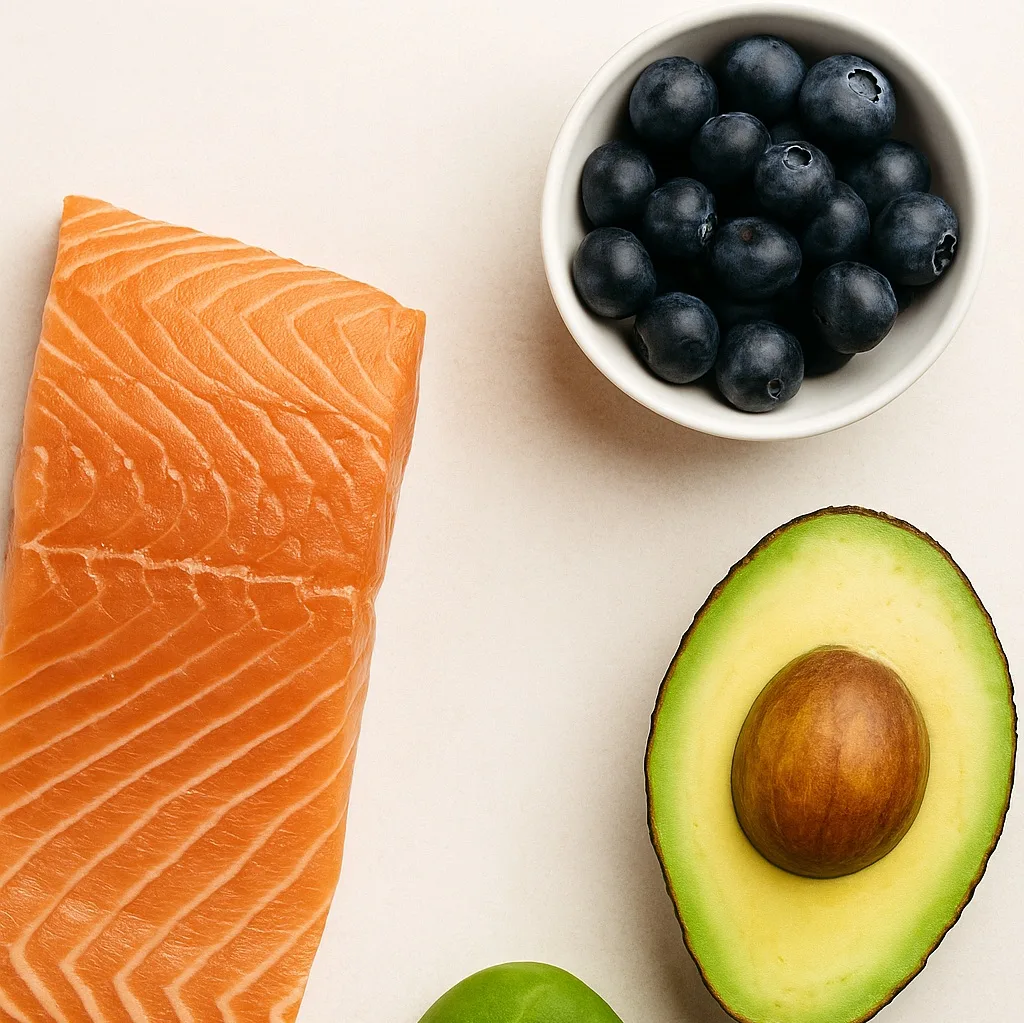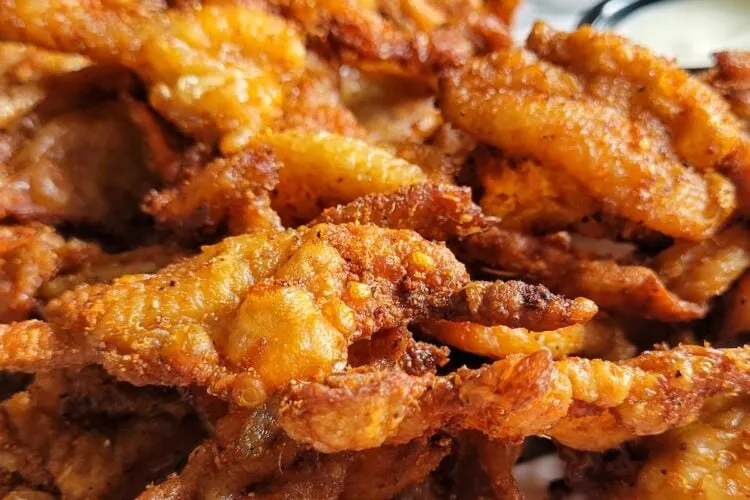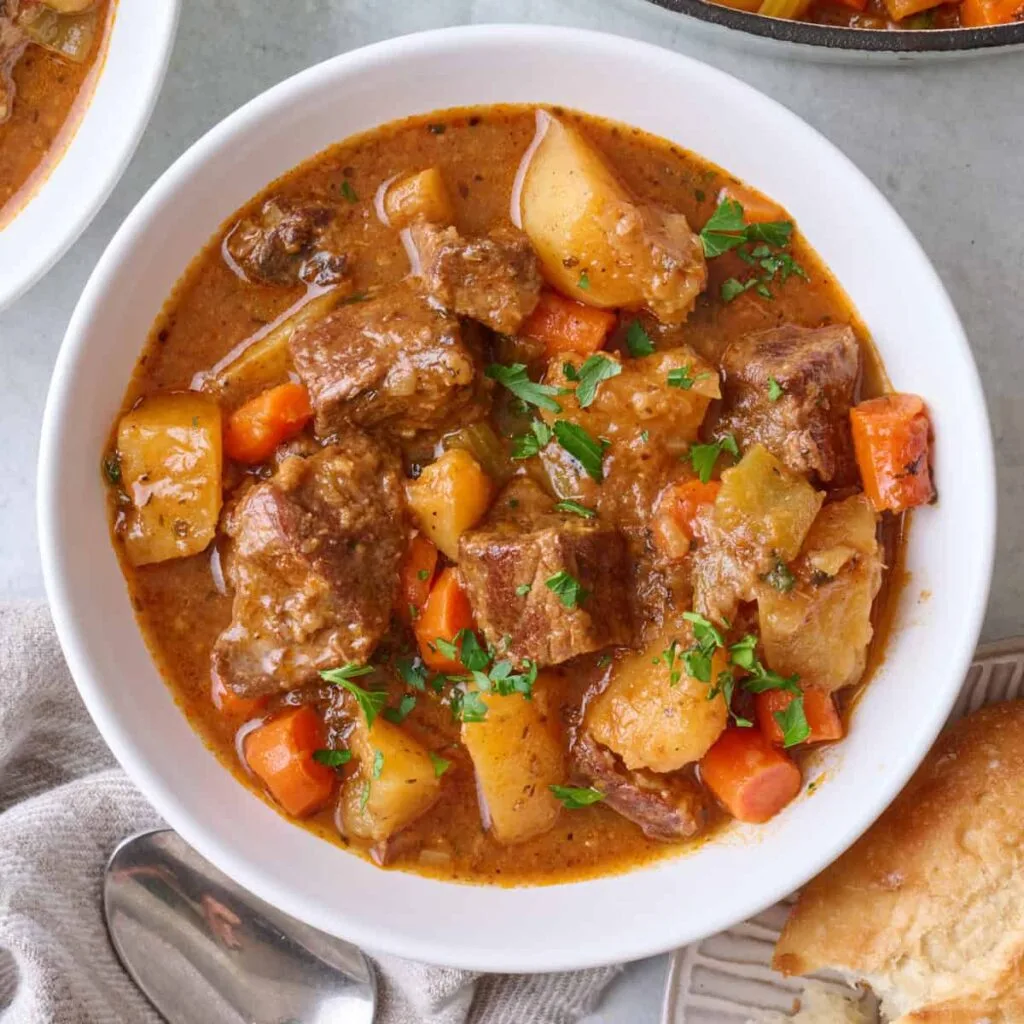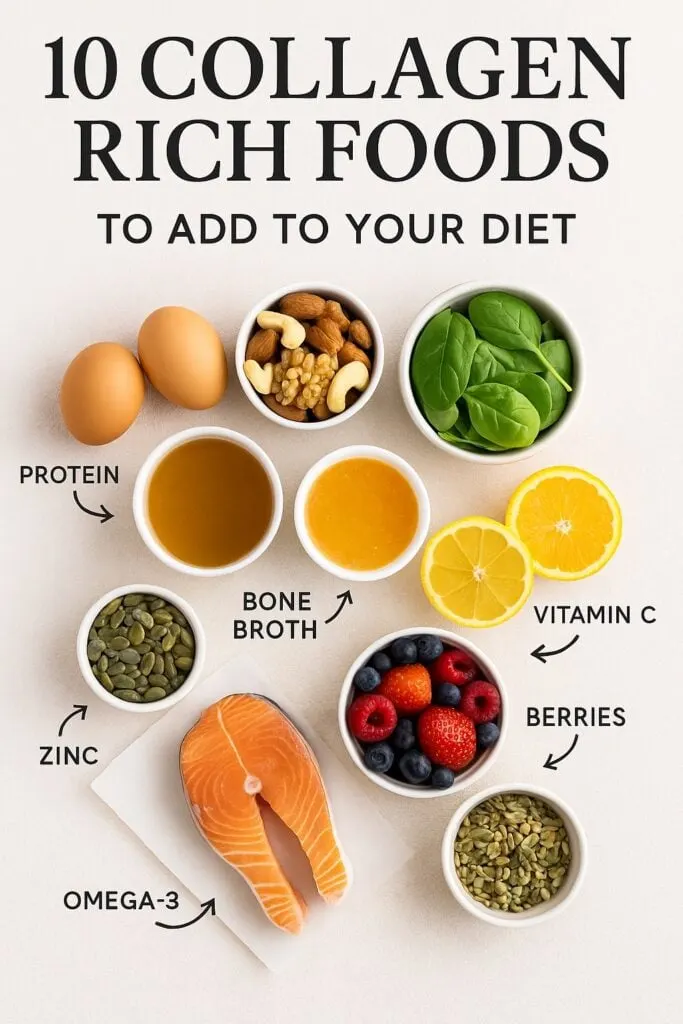Collagen has become a bit of a buzzword, but it’s not just another wellness fad. It’s literally the most abundant protein in your body, making up about one-third of all the protein you carry around every day.
Think of it as the glue that holds everything together: your skin, joints, muscles, bones, tendons, and even the lining of your gut.
When collagen is plentiful, skin stays firm and elastic, joints bend without complaint, and hair has that natural shine we all secretly envy.
Here’s the catch: collagen production slows as you age. By the time you hit your late 20s, your body is already producing less.
That’s why wrinkles start showing, your knees pop more often, and recovery after workouts feels different than it used to. Sun exposure, smoking, and stress speed up the breakdown, too.
So the real question is, can food help replenish what’s lost? The short answer: yes. Certain foods provide collagen directly (especially animal-based ones), while others contain the building blocks your body needs to make its own.
Let’s start with the ones that deliver collagen in its purest form.

Bone Broth – The OG Collagen Powerhouse
Bone broth isn’t fancy, but it’s one of the richest natural sources of collagen you can get.
When you simmer animal bones (chicken, beef, or fish) for hours, the collagen in the connective tissues slowly breaks down into gelatin, filling the broth with amino acids like glycine and proline, the exact raw materials your body needs to build collagen.
People often describe a well-made bone broth as “gelatinous” when cooled. That wobble? Pure collagen.
Drinking it regularly has been linked with better joint comfort, stronger nails, and skin that feels more hydrated.
The catch is the cooking time. A good broth can take 12–24 hours to simmer, which is doable if you’ve got patience and a slow cooker.
If not, there are high-quality bone broth powders that deliver the same benefits without the mess.
Amazon pick: Bone Broth Collagen Powder — great for adding to soups, smoothies, or even coffee.
Chicken Skin, Cartilage, and Yes… Even Feet

Chicken isn’t just a lean protein—it’s a collagen goldmine if you eat the parts people usually throw away.
The skin, cartilage, and connective tissues are packed with collagen, especially Type II collagen, which supports joint health.
In many Asian cuisines, chicken feet are considered a delicacy. They may look intimidating, but they’re mostly skin, tendons, and cartilage, which means a high dose of collagen.
Even if you’re not ready to snack on chicken feet, keeping the skin on your roast chicken or simmering the bones for stock brings you closer to the same benefits.
If you’d rather not cook them yourself, some collagen capsules are sourced from chicken cartilage and are specifically marketed for joint support.
Amazon pick: Chicken Collagen Supplements — a practical option if chicken feet soup isn’t on your menu.
Fish and Fish Skin – The Beauty Food
If you’ve ever crisped salmon skin in a pan, you’ve seen collagen in action, it bubbles, crisps, and becomes almost glassy.
Fish skin, scales, and bones are rich in Type I collagen, the same kind that makes up most of your skin, hair, and nails.
That’s why marine collagen powders are so popular in beauty supplements.
But even without powders, eating the fish itself is an easy win. Salmon, sardines, and mackerel not only contain collagen but also omega-3 fatty acids that reduce inflammation and protect collagen from breaking down.
So you’re getting a double benefit: adding collagen and protecting the collagen you already have.
Eggs – Not Collagen, But Collagen Builders
Eggs don’t contain collagen directly, but egg whites are packed with proline, one of the key amino acids needed to build it.
The yolk brings choline and biotin, which support skin and hair health too. Together, they make eggs a great collagen-supporting food, even if they’re not delivering it in raw form.
For an easy collagen-friendly breakfast, pair scrambled eggs with spinach and a slice of whole-grain toast topped with avocado.
The Vitamin C from greens and healthy fats from avocado help your body use those amino acids efficiently.
Beef and Organ Meats – Old-School Nutrition

Beef, especially cuts with lots of connective tissue like shank, brisket, or oxtail, contains plenty of collagen.
When slow-cooked, these cuts release gelatin into soups and stews, similar to bone broth.
Organ meats, like liver and kidneys, don’t contain as much collagen themselves but are packed with vitamins (like Vitamin A, copper, and zinc) that support collagen production in your body.
They’re nutrient-dense, budget-friendly, and part of traditional diets across cultures.
Amazon pick: Grass-Fed Beef Collagen Powder.
Supplements: When You Don’t Want to Think Too Hard
Here’s the thing, yes, collagen-rich foods are great, but sometimes you want something easy and reliable.
That’s where supplements come in. Hydrolyzed collagen peptides (from beef, chicken, or fish) are broken down into small amino acids, making them easier for your body to absorb.
They can be mixed into coffee, tea, or smoothies without changing the taste much.
Most studies showing benefits for skin hydration, wrinkle reduction, or joint comfort have been done on collagen supplements rather than food alone.
So it makes sense to combine both, eat collagen-rich foods and add a powder if you want more noticeable results.
Skin That Glows, Hair That Shines — Where Collagen Fits In
If you ask most people why they’re interested in collagen, they’ll probably say one of two things: they want smoother skin or healthier joints.
And honestly, that’s fair. Collagen is a building block for both. It gives skin elasticity, helps it bounce back, and strengthens hair from the root.
The cool part? You don’t have to rely on powders alone. Certain foods are naturally rich in collagen or the nutrients your body needs to make more of it.
And when you start paying attention to what goes on your plate, it shows up on your face, hair, and even in the way your body moves.
Collagen Rich Foods for Skin and Hair
Think of this as your beauty menu. These foods aren’t just tasty, they give your body the ingredients it needs to produce collagen or deliver it directly.
- Fatty Fish (Salmon, Sardines, Mackerel)
These are loaded with Type I collagen (great for skin) and omega-3s that reduce inflammation. Omega-3s also help keep your scalp hydrated, which matters for hair growth. - Citrus Fruits
Collagen can’t form without Vitamin C. Oranges, lemons, and grapefruits flood your body with it. Squeeze lemon into your water or add orange slices to a salad. - Berries & Tropical Fruits
Blueberries, strawberries, mangoes, papayas—rich in antioxidants that protect existing collagen from being broken down by free radicals (aka skin-damaging molecules). - Nuts & Seeds
Almonds, pumpkin seeds, and sunflower seeds deliver zinc and copper, both of which play quiet but essential roles in collagen production. Plus, they’re a handy snack. - Eggs (Again, But For Hair Too)
Biotin in egg yolks strengthens hair. Pair that with the proline in egg whites, and you’ve got a natural “beauty from the inside out” combo.
Collagen Rich Foods for Joints
Collagen isn’t just vanity, it’s a function. Joints are cushioned by cartilage, which is made of collagen.
As collagen declines, cartilage thins, making knees and hips feel creaky. Foods that replenish collagen or support its production are like oiling the hinges of a squeaky door.
- Gelatin-Based Foods
Jello may sound old-school, but plain gelatin is basically cooked collagen. You can add unflavored gelatin to smoothies, coffee, or even homemade gummies. - Bone Marrow Dishes
From slow-roasted marrow bones to hearty soups like Indian-style “paya” (goat trotters soup), these traditional foods deliver collagen in a form your body can use. - Leafy Greens
Spinach, kale, and collard greens don’t contain collagen, but their antioxidants protect joints from oxidative stress. Think of them as the shield that keeps collagen intact. - Supplements for Joints
If you don’t want to fuss with cooking bones, chicken collagen supplements are often marketed for joint health.
Vegetarian and Vegan Collagen Boosters
Here’s the honest truth: plants don’t contain collagen. That’s strictly animal territory. But that doesn’t mean vegetarians are left out.
You can still eat foods that boost your body’s natural collagen production. They’re like giving your system the tools and raw materials it needs to build its own.
- Legumes (Lentils, Beans, Chickpeas)
These are high in lysine, an amino acid critical for collagen synthesis. A bowl of dal with rice isn’t just comfort food, it’s collagen-friendly too. - Soy Products (Tofu, Tempeh, Soy Milk)
Soy contains genistein, a plant compound that supports skin elasticity. Plus, it’s a solid source of protein for vegetarians. - Seeds (Chia, Flax, Pumpkin)
Packed with omega-3s and zinc, these tiny powerhouses help protect existing collagen and fuel new production. Sprinkle chia seeds into your morning yogurt or flaxseed into your roti dough. - Leafy Greens & Colorful Veggies
Spinach, kale, tomatoes, and bell peppers are rich in Vitamin C, iron, and antioxidants—all players in collagen formation. - Fruits (Papaya, Kiwi, Guava)
High in Vitamin C and other compounds that help stabilize collagen molecules.
Collagen Rich Foods: Vegetarian Indian Twist
If you’re vegetarian in India, or just love Indian cuisine, there are plenty of collagen-friendly foods already in your kitchen.
- Mung Dal (Moong Lentils): High in protein and lysine, especially when paired with rice.
- Paneer: A protein-rich cheese that helps provide amino acids for collagen synthesis.
- Haldi Doodh (Turmeric Milk): Turmeric reduces inflammation, while milk provides protein. Together, they indirectly support collagen health.
- Seeds and Nuts in Laddoos: Traditional Indian sweets made with sesame, flax, or almonds pack collagen-supporting nutrients in a delicious bite.
Vegan Collagen — Does It Exist?
Here’s where things get interesting. There are now “vegan collagen” supplements on the market.
Technically, they’re not collagen, they’re blends of plant-based amino acids plus Vitamin C, zinc, and copper that mimic the nutritional profile your body needs to build collagen.
Some are even made using genetically engineered yeast and bacteria that produce collagen peptides identical to the animal version.
It’s a newer field, but it’s promising for those who avoid animal products completely.
Collagen Rich Foods in India
When people search “collagen-rich foods India” or “collagen-rich foods Hindi”, what they’re really asking is: “What’s already in my kitchen that can help my skin, joints, or hair?” And the answer is, quite a lot.
Traditional Indian diets, with their emphasis on whole foods, naturally support collagen health.
- Paya Soup (Goat Trotters Broth)
A staple in many households, especially in winter, this slow-cooked soup is packed with collagen from the connective tissues and bones. It’s been used for generations to strengthen joints and improve immunity. - Haldi Doodh (Turmeric Milk)
This golden milk isn’t collagen in itself, but turmeric reduces inflammation while milk proteins support collagen synthesis. It’s basically a comfort drink with hidden beauty benefits. - Mung Dal, Masoor Dal, and Other Lentils
High in protein and lysine, dals act as collagen boosters. A simple dal tadka with rice might not scream “beauty food,” but it quietly feeds your collagen needs. - Paneer and Ghee
Paneer delivers amino acids, while ghee supports nutrient absorption. Combined, they create a nourishing, collagen-friendly combo.
Collagen Rich Foods for Dogs
Yes, you read that right. Collagen isn’t just for humans, dogs benefit too. Older dogs often struggle with joint stiffness, and collagen can help support cartilage and mobility. But not all sources are safe for them, so let’s break it down.
Safe Collagen Foods for Dogs:
- Chicken Feet: Full of cartilage and safe when cooked properly.
- Fish Skin: Dried fish skin treats are rich in collagen and omega-3s.
- Bone Broth: The same one you make for yourself can be given to dogs (unsalted, no onions/garlic).
Avoid:
Cooked bones (they splinter), heavily seasoned broths, or anything with onions/garlic.
FAQs About Collagen-Rich Foods
1. What foods are rich in collagen?
Animal-based foods like bone broth, chicken skin, fish skin, eggs, and beef are direct sources.
Plant foods don’t contain collagen, but can support your body in making it.
2. Are collagen supplements better than foods?
Not necessarily better, just easier. Supplements provide concentrated collagen peptides in a convenient form. But pairing them with whole foods gives you a more balanced approach.
3. Can vegetarians get collagen naturally?
Not directly. Since collagen is only in animal tissues, vegetarians need to focus on collagen boosters like legumes, soy, seeds, leafy greens, and Vitamin C-rich fruits. Vegan collagen supplements are also an option.
4. How long does it take to see results?
Most people report noticeable changes in skin hydration or joint comfort within 6–12 weeks of consistent intake, whether from food or supplements. Consistency matters more than quantity.
5. Collagen-rich foods for hair—what should I eat?
Fatty fish, eggs, nuts, seeds, and Vitamin C fruits are all excellent. They strengthen hair at the root and prevent breakage.
The Real Takeaway
Collagen isn’t a magic fix, but it’s one of the few wellness trends that has real science and tradition behind it.
Generations before us ate bone broth, marrow soups, dals, and seeds without calling it “collagen.” They just knew these foods worked.
Today, whether you’re sipping bone broth, enjoying salmon with crispy skin, or sprinkling chia seeds into your smoothie, you’re giving your body what it needs to look and feel better.
Add supplements if you want faster results, but don’t underestimate the power of whole foods already on your plate.
And yes, if you’re a dog parent, slip some collagen into their bowl too. They’ll thank you with wagging tails and longer walks.

